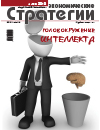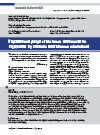Managing Student Performance Potential in the Face of Constant Change
DOI: 10.33917/es-5.163.2019.126-133
At the university, undergraduate and graduate students not only develop their creative abilities, master the profession, and learn to cooperate, but also internalize eternal values, ideals, and find the meaning of life. How university can help them unlock potential, find a vocation in the face of constant change? This study aims to shed light on both university environment and its spirit, where students’ personalities, abilities, and motivation became the basis for building educational trajectories. Using case-study as a research framework, we received insights into studying satisfaction and life-purpose orientations of undergraduate students. The findings indicate the need to pay closer attention to first-year students, since their attitudes and deep development motivation are formed at this very educational stage. We propose to use the early differentiation of educational trajectories, which will help preserve and increase the university potential.
References:
|
1. Snou Ch.P. Portrety i razmyshleniya. Esse. Interv’yu. Vystupleniya [Portraits and Reflections. Essays. Interviews. Speeches]. Moscow, Progress, 1985. 2. Shleiermakher F. Nechayannye mysli o dukhe nemetskikh universitetov (prilozheniem ob odnom iz nikh — nedavno uchrezhdennom) [Unexpected Thoughts on the Spirit of German Universities (Addendum about One of Them — the Newly Established)]. Moscow, Kanon, 2018, p. 90. 3. Maslin M.A. S.N. Trubetskoi kak russkii filosof [Trubetskoy as a Russian Philosopher]. Trubetskoi S.N. Kurs istorii drevnei filosofii [The Course of Ancient Philosophy History]. Moscow, Vlados; Russkii Dvor, 1997, pp. 3–14. 4. Maslou A. Motivatsiya i lichnost’ [Motivation and Personality]. Saint Petersburg, Evraziya, 1999, 478 p. 5. Gratton L. Tochki kipeniya. Kak organizatsii, gruppy i komandy sozdayut energiyu dlya razvitiya i innovatsii [Boiling Points. How Organizations, Groups and Teams Generate Energy for Development and Innovation]. Moscow, Best Biznes Buks, 2008. 283 s. 6. Zhuravlev A.L., Nestik T.A. Vnutrigruppovye I organizatsionnye faktory sovmestnogo tvorchestva [Intra-Group and Organizational Factors of Collaborative Creativity]. Vestnik prakticheskoi psikhologii obrazovaniya, 2011, no 1, pp. 55–61. 7. Oleskin A.V., Kurdyumov V.S. Detsentralizovannye setevye struktury v nauchnom soobshchestve, sisteme obrazovaniya, grazhdanskom obshchestve i biznese: model’ khiramy [Decentralized Network Structures in the Scientific Community, the Education System, Civil Society and Business: Hirama Model]. Ekonomicheskie strategii, 2018, no 1, pp. 104–122. 8. Granovetter M. Sila slabykh svyazei. Klassika novoi ekonomicheskoi sotsiologii [Strength of Weak Ties. The Classics of New Economic Sociology]. Moscow, VShE, 2016, pp. 71–96. 9. Adizes I. Upravlyaya izmeneniyami. Kak effektivno upravlyat’ izmeneniyami v obshchestve, biznese i lichnoi zhizni [Managing Changes. How to Manage Effectively Changes in Society, Business and Personal Life]. Moscow, 2017. 10. Leontiev D.A. Lichnostnyi potentsial: struktura i diagnostika [Human Potential: Structure and Siagnosis]. Moscow, Smysl, 2011 11. Leontiev D.A., Suchkov D.D. Postanovka i dostizhenie tselei kak faktor psikhologicheskogo blagopoluchiya [Setting and Achieving Goals as a Factor of Psychological Well-Being]. Psikhologicheskie issledovaniya, 2015, no 44, available at: http://psystudy.ru/index.php/num/2015v8n44/300-leontiev44.html. 12. Andreev A. L., Novokhat’ko I. M., Osipova A. S. Issledovanie motivatsii nauchnoi deyatel’nosti v universitete kak korporatsii v ramkakh institutsional’nogo podkhoda [The Study of Scientific Activity Motivation at the University as a Corporation Within the Institutional Approach]. Sotsiologicheskaya nauka i sotsial’naya praktika, 2017, no 4, pp. 27–45. 13. Gordeeva T.O. Teoriya samodeterminatsii: nastoyashchee i budushchee. Chast’ 1: Problemy razvitiya teorii [Self-Determination Theory: the Present and the Future. Part 1: Problems of Theory Development]. Psikhologicheskie issledovaniya, 2010, no 4–5 14. Frankl V. Chelovek v poiskakh smysla [Man’s Search for Meaning]. Moscow, Progress, 1990. 368 s. 15. Leontiev D.A. Test cmyslozhiznennykh orientatsii (SZhO) [Test of Life-Meaning Orientations (LMO)]. Moscow, Smysl, 2000, 18 p. 16. Kozina I.M. Sase study: Nekotorye metodicheskie problem [Сase Study: Some Methodological Problems]. Rubezh, 1997, no 10–11, pp. 177–189. |



